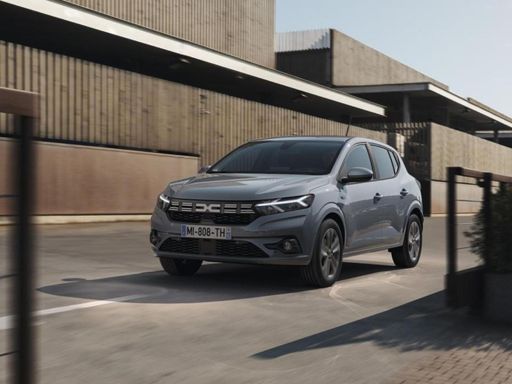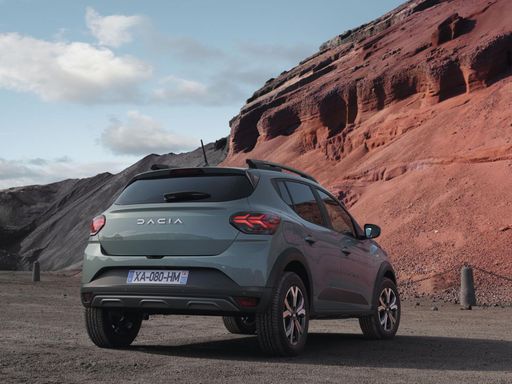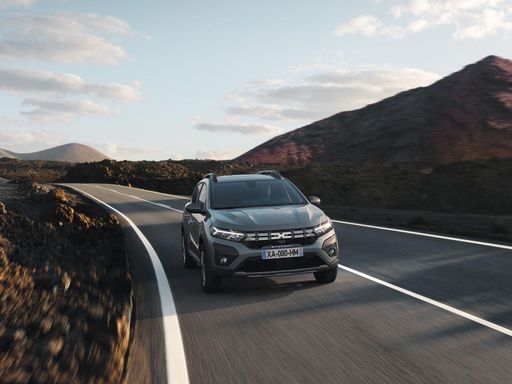Dacia Sandero VS Kia PV5 – Specs, Efficiency & Price Comparison
Which model is the better choice – the Dacia Sandero or the Kia PV5? We compare performance (110 HP vs 121 HP), boot capacity (328 L vs ), efficiency (5.30 L vs ), and of course, the price (10700 £ vs 33600 £).
Find out now which car fits your needs better!
The Dacia Sandero (Hatchback) is powered by a Petrol or LPG engine and comes with a Manuel or Automatic transmission. In comparison, the Kia PV5 (Cargo Van) features a Electric engine and a Automatic gearbox.
When it comes to boot capacity, the Dacia Sandero offers 328 L, while the Kia PV5 provides – depending on what matters most to you. If you’re looking for more power, you’ll need to decide whether the 110 HP of the Dacia Sandero or the 121 HP of the Kia PV5 suits your needs better.
There are also differences in efficiency: 5.30 L vs . In terms of price, the Dacia Sandero starts at 10700 £, while the Kia PV5 is available from 33600 £.
Compare all the key specs now and find out which model fits your lifestyle best!
Dacia Sandero
The Dacia Sandero stands out as an exceptional value in the hatchback market, offering a blend of practicality and affordability that appeals to a wide range of drivers. Its understated design is complemented by a surprisingly spacious interior, providing ample comfort and functionality for everyday use. With impressive fuel efficiency and a solid reputation for reliability, the Sandero remains a popular choice for those seeking a no-nonsense vehicle without sacrificing essential modern features.
details @ dacia.at
@ dacia.at
 @ dacia.at
@ dacia.at
 @ dacia.at
@ dacia.at
Kia PV5
The Kia EV5 is an exciting new entrant in the landscape of electric SUVs, promising a blend of style and innovation that captures attention. It boasts a sleek and modern design that aligns with Kia's evolving aesthetic identity, blending practicality with eye-catching details. With its foray into the electric vehicle segment, the EV5 is set to offer a highly competitive option for those looking to embrace sustainable mobility without compromising on comfort or tech features.
details

|
|
|
|
|
Costs and Consumption |
|
|---|---|
|
Price
10700 - 16700 £
|
Price
33600 £
|
|
Consumption L/100km
5.3 - 7.1 L
|
Consumption L/100km
-
|
|
Consumption kWh/100km
-
|
Consumption kWh/100km
-
|
|
Electric Range
-
|
Electric Range
291 km
|
|
Battery Capacity
-
|
Battery Capacity
51.50 kWh
|
|
co2
105 - 140 g/km
|
co2
0 g/km
|
|
Fuel tank capacity
32 - 50 L
|
Fuel tank capacity
-
|
Dimensions and Body |
|
|---|---|
|
Body Type
Hatchback
|
Body Type
Cargo Van
|
|
Seats
5
|
Seats
2
|
|
Doors
5
|
Doors
4
|
|
Curb weight
1089 - 1209 kg
|
Curb weight
-
|
|
Trunk capacity
328 L
|
Trunk capacity
-
|
|
Length
4088 - 4099 mm
|
Length
4695 mm
|
|
Width
1848 mm
|
Width
1850 mm
|
|
Height
1499 - 1535 mm
|
Height
1923 mm
|
|
Payload
404 - 436 kg
|
Payload
-
|
Engine and Performance |
|
|---|---|
|
Engine Type
Petrol, LPG
|
Engine Type
Electric
|
|
Transmission
Manuel, Automatic
|
Transmission
Automatic
|
|
Transmission Detail
Schaltgetriebe
|
Transmission Detail
Reduction Gearbox
|
|
Drive Type
Front-Wheel Drive
|
Drive Type
Front-Wheel Drive
|
|
Power HP
67 - 110 HP
|
Power HP
121 HP
|
|
Acceleration 0-100km/h
10 - 16.7 s
|
Acceleration 0-100km/h
16.30 s
|
|
Max Speed
158 - 183 km/h
|
Max Speed
135 km/h
|
|
Torque
95 - 200 Nm
|
Torque
250 Nm
|
|
Number of Cylinders
3
|
Number of Cylinders
-
|
|
Power kW
49 - 81 kW
|
Power kW
89 kW
|
|
Engine capacity
999 cm3
|
Engine capacity
-
|
General |
|
|---|---|
|
Model Year
2024 - 2025
|
Model Year
2025
|
|
CO2 Efficiency Class
D, C, E
|
CO2 Efficiency Class
A
|
|
Brand
Dacia
|
Brand
Kia
|
Dacia Sandero
The Dacia Sandero: An Affordable Gem in the Automotive World
The Dacia Sandero has consistently positioned itself as a quintessential choice for budget-conscious buyers who seek practicality without sacrificing quality. As an integral part of Dacia's line-up, the Sandero offers a compelling blend of efficiency, robustness, and value for money. With the 2024 model, Dacia continues to enhance its offerings with a range of engine options and trim levels to satisfy diverse customer needs.
Innovative Engine Options
The latest Dacia Sandero boasts a variety of engine options, including petrol and gas variants. The range covers outputs from 67 PS to 110 PS, providing flexibility for different driving preferences. For those prioritising fuel economy, the SCe 65 petrol engine offers a commendable consumption figure of 5.3 litres per 100 km. Meanwhile, the TCe 100 ECO-G engine, running on gas, balances efficiency and performance with an output of 101 PS and a consumption of 6.5 litres per 100 km.
Efficiency and Driving Dynamics
With the Dacia Sandero, efficiency is key. The innovative TCe 90 petrol engine, available with both manual and automatic transmissions, ensures a smooth ride combined with competitive fuel efficiency - approximately 5.2 to 5.7 litres per 100 km. Additionally, the Sandero maintains impressive CO2 emissions ranging from 105 to 139 g/km, reinforcing its suitability for eco-conscious drivers.
Practical Design and Spacious Interiors
The Dacia Sandero’s design speaks to the needs of modern urban and suburban drivers. As a five-door hatchback, it provides enormous practicality alongside a spacious interior. The cabin comfortably seats five passengers and offers a generous 328-litre boot, which can easily accommodate everyday luggage and more. Its exterior dimensions, including a length of 4088 to 4099 mm and a width of 1848 mm, enable the Sandero to navigate city streets with ease.
Safety and Technological Features
Safety remains a priority for Dacia, and the Sandero is equipped with a host of features to ensure peace of mind for drivers and passengers. Options such as the latest braking technologies, stability control, and multiple airbags come standard across various trim levels. Technologically, the Sandero incorporates features like a modern infotainment system and essential connectivity options to enhance the driving experience.
Concluding Thoughts
The Dacia Sandero represents a remarkable blend of affordability, efficiency, and practicality, solidifying its place in the competitive compact car segment. Whether it's daily city commutes or longer journeys, the Sandero offers a version tailored to meet a wide array of demands and preferences, embodying Dacia’s commitment to delivering more for less. With competitive pricing and the promise of a reliable, economical drive, the 2024 Sandero continues to resonate with those seeking value in their automotive investment.
Kia PV5
A Fresh Perspective on Cargo Vans: The Kia PV5
The Kia PV5 stands as a beacon of innovation in the realm of electric cargo vans. Known for its forward-thinking design and practicality, this model sets a new standard in its class. The PV5 combines cutting-edge technology with an eco-friendly design, redefining the expectations for businesses seeking sustainable transportation solutions.
Electric Power Meets Efficiency
At the heart of the Kia PV5 lies an advanced electric powertrain. The model is equipped with a 51.5 kWh battery, offering an impressive electric range of 291 km on a single charge. This robust power supply pairs with a front-wheel-drive system powered by an electric motor that delivers 121 HP (equivalent to 89 kW), keeping the operations both smooth and efficient.
Sustainability Without Compromise
The commitment to sustainability is evident in the PV5’s zero emissions, with a CO2 output of 0 g/km. The van maintains a CO2 Efficiency Class of A, clearly demonstrating Kia’s dedication to reducing the environmental impact of its vehicles. Businesses adopting the PV5 can confidently promote their green credentials while benefiting from the cost savings associated with electric driving.
Designed for Modern Business Needs
The Kia PV5 Cargo L2H1 Electric Automatic model is engineered for functionality and ease of use. Its spacious design accommodates two seats and offers a generous cargo area, making it perfect for diverse delivery needs. The van spans 4695 mm in length, 1850 mm in width, and 1923 mm in height, providing ample space to maneuver goods with ease.
Performance and Practicality
In terms of performance, the PV5 boasts a torque of 250 Nm and can accelerate from 0 to 100 km/h in 16.3 seconds. While its top speed is capped at 135 km/h, this is more than sufficient for urban and suburban delivery routes. The reduction gearbox ensures smooth transitions as it navigates through daily tasks.
Safety and Innovation
Safety is not compromised with the Kia PV5. It features a suite of safety technologies that support the driver in maintaining control and avoiding incidents. These innovations not only contribute to the safety of the driver and cargo but also offer peace of mind to businesses that prioritize the wellbeing of their workforce and goods.
The Road Ahead for Kia PV5
As the automotive industry continues to move towards electrification, the Kia PV5 exemplifies how cargo vans can adapt to this change seamlessly. It represents an essential step towards more sustainable business operations, providing a viable and efficient option for companies looking to reduce their carbon footprint while enhancing operational efficiency. The Kia PV5 is more than just a vehicle; it’s a strategic asset for any forward-thinking business.
The prices and data displayed are estimates based on German list prices and may vary by country. This information is not legally binding.
